Enzyme within cancer cells prevents immune system from fighting disease
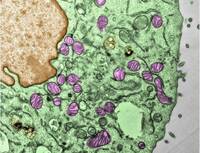
An enzyme in cancer cells called aconitate decarboxylase (Acod1) appears to cause the release of short chains of amino acids, called peptides, that interfere with the way our bodies’ immune cells fight the disease, a new study by University of Notre Dame cancer biologist Zachary…
Ecological Society of America awards honors for research papers from Rohr, McLachlan labs
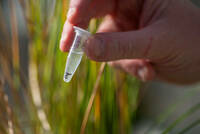
Researchers in the Department of Biological Sciences at the University of Notre Dame have been honored with awards from the Ecological Society of America (ESA) for their research. …
2024 International Frontiers Prize awarded to Notre Dame’s Jason Rohr for innovative public health and sustainability research
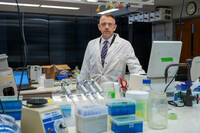
Jason Rohr, Galla Professor and Chair of the Department of Biological Sciences at the University of Notre Dame, is one of three international winners of the 2024 Frontiers Planet Prize for his research that helps improve public health, agriculture, sustainability…
Ecological Society of America awards honors for research papers from Rohr, McLachlan labs

Researchers in the Department of Biological Sciences at the University of Notre Dame have been honored with awards from the Ecological Society of America (ESA) for their research. …
Notre Dame study demonstrates that bacterial biofilms are not the same throughout, possibly describing one reason common antibiotics may fail
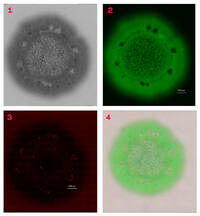
“We didn’t know how diverse the bacterial behavior was in such a small amount of space,” said Joshua Shrout, whose article was published in the Journal of Bacteriology.
Enzyme within cancer cells prevents immune system from fighting disease

An enzyme in cancer cells called aconitate decarboxylase (Acod1) appears to cause the release of short chains of amino acids, called peptides, that interfere with the way our bodies’ immune cells fight the disease, a new study by University of Notre Dame cancer biologist Zachary…
Enzyme within cancer cells prevents immune system from fighting disease

An enzyme in cancer cells called aconitate decarboxylase (Acod1) appears to cause the release of short chains of amino acids, called peptides, that interfere with the way our bodies’ immune cells fight the disease, a new study by University of Notre Dame cancer biologist Zachary…
In memoriam: Charles Kulpa, professor emeritus of biological sciences

Charles “Chuck” Frank Kulpa, professor emeritus in the Department of Biological Sciences, died April 30 in South Bend. He was 80. Kulpa was a respected scholar and professor of environmental and applied microbiology for 40 years.
As humans change the globe, they also influence the transmission of diseases, an extensive study in Nature shows

Human activity across the globe contributes to the rise in emerging infectious disease, but researchers had not concluded which of these activities, called global change drivers, increases risk the most. …
Component of keto diet plus immunotherapy may reduce prostate cancer
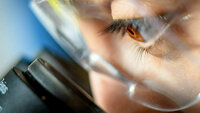
Adding a pre-ketone supplement — a component of a high-fat, low-carb ketogenic diet — to a type of cancer therapy in a laboratory setting was highly effective for treating prostate cancer, researchers from the University of Notre Dame found.
Jason Rohr named U.S. national champion for Frontiers Planet Prize for breakthrough sustainability research

Jason Rohr, Galla Professor and Chair of the Department of Biological Sciences at the University of Notre Dame, is the United States national champion for the Frontiers Planet Prize, which recognizes…
Schnell joins inaugural statewide rare disease advisory council

Santiago Schnell, William K. Warren Foundation Dean of the College of Science at the University of Notre Dame, has been appointed to a new statewide advisory council to explore new directions for assisting patients with…
Professor emerita wins prestigious lifelong achievement award for her work assessing environmental injustice

Kristin Shrader-Frechette, O’Neill Family Professor Emerita in the University of Notre Dame Department of Philosophy, who had a concurrent appointment in the Department of Biological Sciences, has won the 2023…
Eliminating public health scourge can also benefit agriculture

Schistosomiasis, a parasitic disease that causes organ damage and death, affected more than 250 million people worldwide in 2021, according to the World Health Organization. …
Sanders named associate director of Genomics and Bioinformatics Core Facility

Sheri Sanders considered becoming a veterinarian, but after one semester of coursework she realized she preferred working in a laboratory and tinkering with programming.
Rohr and international team win accolades from Ecological Society of America
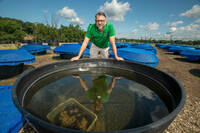
A team of international researchers that includes those from the Department of Biological Sciences at the University of Notre Dame has been honored with the George Mercer Award from the Ecological Society of America.
Collaboration for cold-chain biological transportation in Belize yields positive results

Keeping biological samples, medications, testing supplies and vaccines at the temperatures that do not exceed manufacturer requirements is crucial for public health, and yet this process has proven…
Notre Dame sheds (colorful) light on International Rare Disease Day

Third-grader Skylar Sevison eagerly squished her hand into a tin of purple fingerpaint in Jordan Hall of Science, then stamped it onto a poster with other colorful handprints representing …
Son honors mother’s memory through new neuroscience research fund

Local auto sales representative Caleb Fairchild starts memorial fund for his mother after reading about neuroscience research being done at the University of Notre Dame.
Rapid plant evolution may make coastal regions more susceptible to flooding and sea level rise, study shows
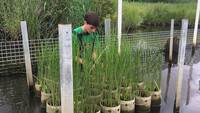
Evolution has occurred more rapidly than previously thought in the Chesapeake Bay wetlands, which may decrease the chance that coastal marshes can withstand future sea level rise, researchers at the University of Notre Dame and collaborators demonstrated in a recent publication in Science.
Biology professor’s catheter technology awarded funding from Open Philanthropy

Ana Flores Mireles was awarded funding from Open Philanthropy for further development of a new type of urinary catheter that may reduce deaths from catheter-induced urinary tract infections.
Postdoctoral couple works in Koepfli lab to develop malaria detection tools
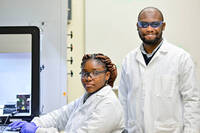
Though the married couple's search began during the Covid-19 pandemic, both researchers landed jobs as postdocs in the same laboratory
Simulation model of Midwest forests could aid in predicting future climate change

Gains in carbon stored in upper American Midwest forests continued for more than 8,000 years before the industrial revolution were erased in less than two centuries, according to a new study in Scienceby researchers at the University of Notre Dame and collaborators.
Doctoral student Sean Murphy awarded NIH Fellow Transition Award

Only around 24 predoctoral to postdoctoral fellow transition awards (F99/K00) are awarded each year by the National Cancer Institute, a branch of the National Institutes of Health.
Newly described, atypical transporter gene shown to have role in antifungal resistance

In a recent paper, Santiago-Tirado and his colleagues describe a gene they discovered that increases the chance for drug resistance in the fungi Cryptococcus neoformans.
Lymphatics help ‘seed’ early brain cells in zebrafish
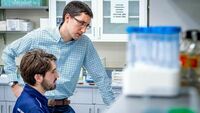
A recent paper in Nature Neuroscience by University of Notre Dame biologist Cody J. Smith demonstrated how lymphatics — which remove waste from the rest of the body — are also associated with microglia and brain development in zebrafish.
University of Notre Dame researchers discover how proteins move cargo across TB cell wall
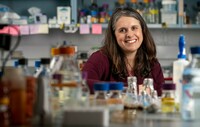
A new study conducted at the University of Notre Dame unraveled a mystery scientists had previously not been able to pinpoint: There is an order to how disease-causing substrates, or “cargo,” cross a similar bacteria’s unique two-walled membrane.
Faculty members receive awards for teaching, research, and advising

Three College of Science faculty members received awards during the 2022 Dean’s Luncheon for their work in either research, teaching, or advising.
Class of 2022 College of Science Seniors honored at annual luncheon
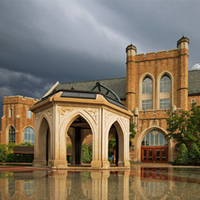
More than 50 seniors and 11 faculty members were recognized for outstanding achievements during the University of Notre Dame’s College of Science Dean’s Awards Luncheon.
